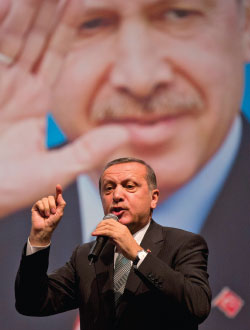Turkish Exceptionalism and its Critics

 Harder times are triggering the baser instincts of the rulers of Asia Minor
Harder times are triggering the baser instincts of the rulers of Asia Minor
Like most governments that have been in power more than a decade, the government of the Justice and Development Party (JDP) has started to show signs of fatigue. This was most apparent in the Gezi Park protests in May and June of last year, as well as in the corruption allegations levelled against the JDP government in late December. The recent protests against the government’s Internet laws have only solidified this general tendency.
The fatigue has little to do with government inefficiency or slowdown – the typical consequences of many years in office. Rather, it has more to do with power hoarding – to wit, the wholesale exclusion from the political system, and in some cases punishment, of potential challengers for power. When criticized for power hoarding, the naming of ‘foreign agents and collaborators’ has become the standard deflection measure employed by the JDP, and in particular by Prime Minister Recep Tayyip Erdogan. Indeed, the blaming of ‘foreign agents and collaborators’ is part and parcel of the ‘Turkey under siege’ mentality that has long been critical to the toolbox of Turkish politicians. This mentality, which may be seen as a form of Turkish ‘negative exceptionalism,’ involves insinuations about Turkey’s ‘uniqueness’ and the presence of ‘foreign agents’ trying to destabilize Turkey as a consequence of this ‘uniqueness.’
The JDP was established in August 2001 – during the worst economic crisis in the history of modern Turkey – by a splinter group that broke away from the Welfare Party. (The Welfare Party – an Islamist party – was ousted from power in 1997 and subsequently shut down in what has been called the February 28th Process.) Having tabled a pro-EU, liberal agenda, the JDP was brought to power in November 2002 by Turkish voters who were tired of continuous mismanagement of the country by coalition governments.
Despite the resumption of ‘low-intensity conflict’ with Kurdish separatists in the summer of 2004, the JDP delivered what it had promised: relative political stability, improvement in public services, and stable economic growth – later marketed as the ‘Turkish miracle.’ In point of fact, this ‘Turkish (economic) miracle’ was due to meticulous application of the IMF programme initiated by the previous coalition government, liquidity in the global economy, and a construction boom – that is, billions of dollars spent on public works, public housing, glitzy malls and residential complexes.
Momentum and luck have, until now, been largely on the side of the JDP. The party won the general elections in 2007 and 2011. Abdullah Gul, also of the JDP, won the presidential election in 2007. By the time it emerged from the successful 2010 constitutional referendum, the JDP was sufficiently confident to be able to implement a vision based on a more assertive worldview internationally and a more conservative one domestically.
Turkey began to position itself as a term-setter in regional affairs. Taking the cue from Minister of Foreign Affairs Ahmet Davutoglu’s ‘Strategic Depth Doctrine,’ the JDP government claimed for Ankara a primary role in international affairs based on Turkey’s supposed geographical and historical uniqueness. Davutoglu’s logic held that Turkey’s location between East and West and its Ottoman heritage automatically qualified Turkey as a power broker.
On the domestic front, Erdogan announced that “those who are not in line with us will be pushed to the sidelines.” Media critical of the JDP government have been silenced. The military’s traditional involvement in national political life – originally curtailed as part of EU harmonization laws – has been turned on its head through allegations of conspiracy, with dozens of active and retired members of the Turkish armed forces, including several former chiefs of staff, having been tried and sent to prison for allegedly attempting to stage a coup. What came to be known as the Ergenekon and Balyoz trials effectively created a military that would nary have the teeth to challenge the JDP government.
The reluctant alliance between the JDP and the Gulen community, a religious network with extensive business ties – brokered in April 2007 – began to show signs of stress. Following the Flotilla Incident in May 2010, which led to one of the worst ever diplomatic crises between Turkey and Israel, Fethullah Gulen, the leader of the Gulen community (who has been in self-imposed exile in the US since 1999), criticized Ankara by saying that permission should have been obtained from Israel in advance. In February 2012, media outlets close to the Gulen community leaked information about Turkey’s National Intelligence Organization holding talks with the PKK, tarnishing the uncompromising image that the JDP had wanted to maintain against Kurdish separatists.
The Gezi Park protests and the corruption scandal that came to be known as the December 17th Operation unfolded against this backdrop. The protests started when the authorities decided to replace the park with a 19th century artillery barrack in the form of a mall and a residential complex as part of the reorganization of Taksim Square. Faced with the use of excessive force by the police, the peaceful sit-in in the park quickly turned into anti-government protests in Istanbul, spreading to other major Turkish cities. Quite independently of the logic driving the contemporaneous protests of the Arab Spring, these protests followed the introduction of a law regulating the sale of alcohol, as well as abortions and C-sections – all interpreted as clear moves by the JDP to push for a more Islamist way of life for Turks.
During the protests, while some cabinet members and President Gul stated that they had understood the protesters’ message, Erdogan’s attitude was largely uncompromising. He called the protesters “marginals” and “looters.” He called Twitter, which was crucial in the organization of the protests, a “malice,” and commended the police that had used force during the protests for “writing history.” He argued that, because the JDP had won 50 percent of the votes in the 2011 elections, those who did not vote for the JDP had to obey the “national will.”
More importantly, Erdogan declared that the protesters had been organized by foreign agents, including foreign media organizations and “interest lobbies” that sought to make money from the destabilization of the national economy (thanks to the political protests). Erdogan and other members of the JDP used similar blame deflection when the December 17th corruption scandal broke last year. The first round of the scandal ended with the arrest of two of the sons of cabinet ministers, a Turkish businessman of Iranian origin, and the CEO of the state-owned Halkbank. The scandal became public when the minutes of a 2004 National Security Council meeting were leaked, suggesting that the JDP government had been planning a crackdown on the Gulen community, and was debating the closure of preparatory schools owned by networks close to Gulen.
The initial response by Erdogan and the JDP to the scandal was a cabinet reshuffle. This was followed by the reappointment of hundreds of members of the police force, and an attempt to tighten the government’s grip on the judiciary. Erdogan and other members of the JDP called the scandal a conspiracy launched by a “parallel state” aiming to tarnish the JDP’s image. The US ambassador to Ankara, Francis Ricciardone, was accused of “getting involved in provocative actions,” and was threatened with persona non grata status.
With three elections upcoming – municipal and presidential elections this year, and a general election in 2015 – what is clear is that there will be more power hoarding by exclusion; that is, more negative exceptionalism, perpetuating the ‘Turkey under siege mentality’ that will result in Ankara looking for more scapegoats within and outside of Turkey. Despite the JDP’s articulated plans to stay in power through 2023, despite all of this power hoarding, and given the current frailty of the Turkish economy, it might well be another economic crisis that undermines the JDP’s standing and sweeps it from power. After all, the JDP first came to power on the coattails of an economic crisis.
This possibility, combined with the intensifying search for ‘foreign’ scapegoats, could mean that Turkey’s political class will increasingly flirt with conspicuous displays of nationalism. This bodes ill for an already polarized Turkey. And it will not leave the region unaffected.
Lerna K. Yanik is an associate professor in the Department of Political Science and Public Administration at Kadir Has University in Istanbul.











